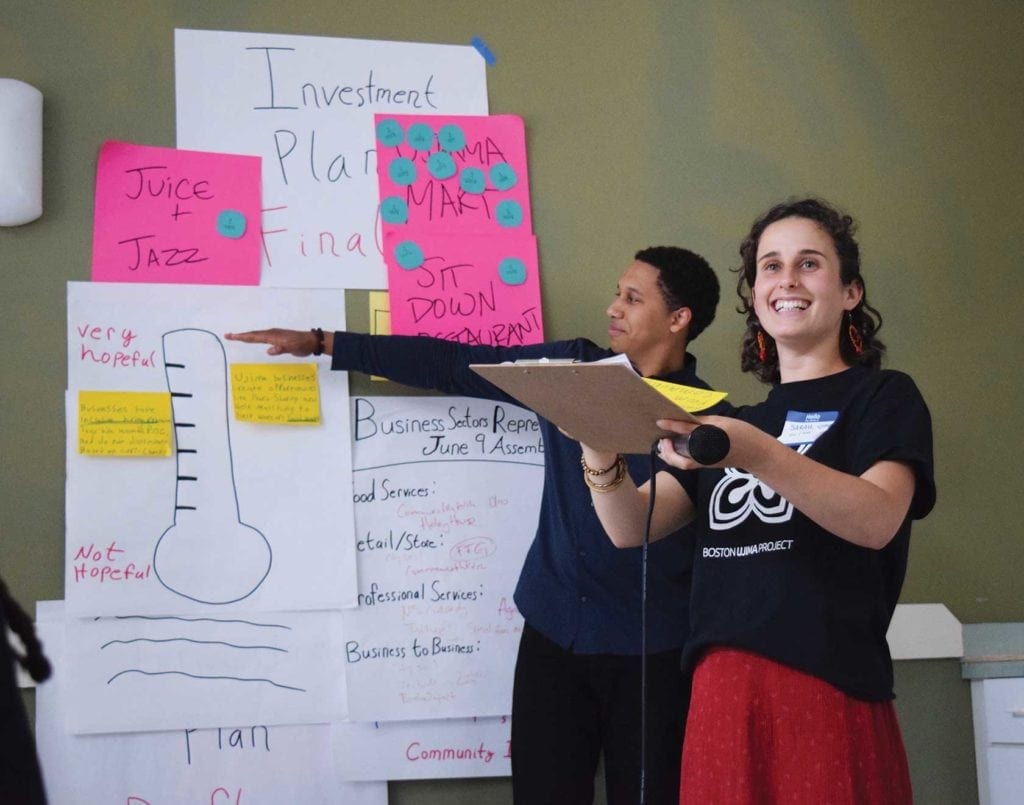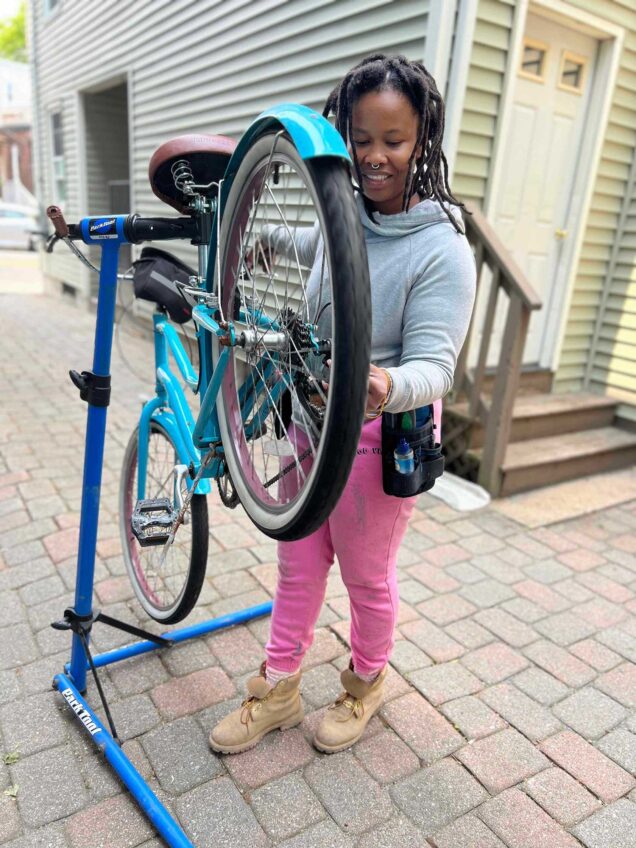The people’s economy
The Boston Ujima Project hosts assembly for businesses

Dorchester residents and business owners gathered at the Erie Ellington Community Center on Saturday for a Boston Ujima Project assembly where through a participatory process, attendees helped draft an investment plan for a new local economy.
The Ujima Project aims to become the first democratically governed capital fund and economic network of its kind in the U.S.
The project started accepting members last September — there are 327 so far — and each member is given one vote towards any decision-making, regardless of how much they have invested.

Lucas Turner-Owens, fund manager; Aaron Tanaka, co-founder of Boston Ujima Project; and Nia Evans, executive director of Boston Ujima Project lead a participatory voting process during the June 9 assembly. Banner Photo
The assembly on June 9 was co-hosted by the Black Economic Justice Institute and more than 30 people attended.
Participants discussed the businesses they support, the types of businesses that are needed in the community and best practices to improve current local businesses. Their ideas will directly influence the investment plan for Ujima’s Community Capital Fund.
An investment committee will oversee the investment plan and request ideas for fund proposals, either to support an existing local business or start a new one.
Local businesses in attendance included Commonwealth Kitchen, Haley House, Boston Impact Initiative, Olio Culinary Collective, Agaric and IncluDe.
Some of the businesses and organizations identified by members at the last assembly in September were rated by customer satisfaction and community impact. They include: Merengue Restaurant, First Teacher Boston, Ali’s Roti Restaurant, and Le Foyer Bakery.
Attendees discussed standards and guidelines on how to rate businesses they support and utilize day-to-day.
Standing up for political issues, giving employees a fair, living wage, and offering opportunities for profit sharing such as 401(k) matching were voted on as the most important factors that qualify an establishment to be designated a “Good Business.”
Additionally, businesses that value sustainable and environmentally friendly practices, hire women and people of color and respond to consumer needs were other identified standards.
Last year, during their pilot, the Ujima Project raised $20,000 for the Community Capital Fund through 175 small lenders and larger investors matching those funds. The $20,000 was then allocated through a participant vote to five local black-owned and immigrant-owned businesses, each of which received zero-interest loans of $3,000 to $5,000.
According to Aaron Tanaka, co-founder of Boston Ujima Project, the community will begin another capital fundraising process in September. This time, the funding goal is in the millions.
Nia Evans, executive director of the Boston Ujima Project said that three of the businesses that received the community capital fund loans are paying back regularly on time.
The other two are working directly with the Ujima Project to get back on track.
‘Good Business’ network
Lucas Turner-Owens, fund manager for the Boston Ujima Project, helps manage the project’s business alliance, which is currently made up of 17 local businesses, including three of the capital fund loan recipients. These businesses are certified and recognized by the Ujima Project as “Good Businesses.”
“We connect them with new contracts, technical assistance, interview them to see if they need any funding help, but not all of them do. They are looking for other types of support besides loans,” said Turner-Owens.
Priscilla Flint-Banks, co-founder of BEJI, said she supports the Ujima Project because she loves “the whole concept of looking at where we spend our money.”
She continued, “With gentrification in our neighborhood, we’re sick and tired of displacement, so we decided to come together.”
Evans said that Saturday’s event was the project’s second-ever assembly. Next up will be an assembly focused on Dorchester’s young people, in partnership with The City School, an after-school youth organization.
“Where we do assemblies is determined by our grassroots partners,” said Evans. “It’s important for us that we don’t ignore the work that has already happened and that we build upon that work.”
To join the Ujima Project network, the standard membership fee is $25, with discounts for various groups, such as youth ages 14–24.
“We weren’t sure the community would be into it when we first started,” said Tanaka, noting that the project has received enormous support from residents.
“It’s rare for people to be respected enough and asked where they want to see resources go,” he said. “Usually, the economy happens to people — but instead, we can drive the economy.”






